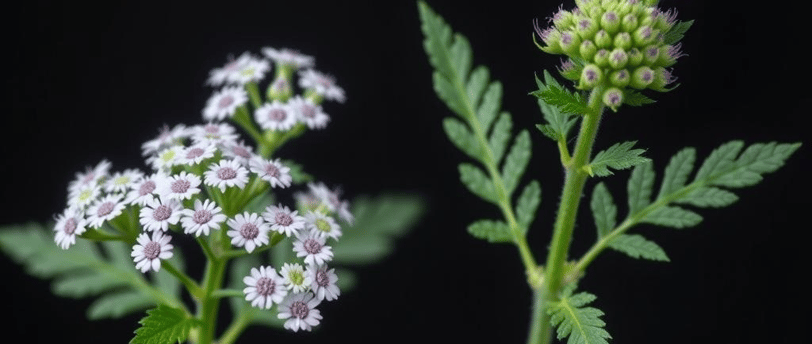Yarrow for Heart Health: The Herb That Improves Circulation and Reduces Blood Pressure
❤️HEART HEALTH


In the ever-evolving landscape of natural remedies and herbal medicine, yarrow (Achillea millefolium) stands out as a time-honored herb celebrated for its many health benefits. Particularly, its potential contributions to heart health have garnered attention from researchers, nutritionists, and health enthusiasts alike. With an increasing interest in herbal remedies as complementary therapies for cardiovascular wellness, it’s essential to explore the forms available, effective recipes, recommended dosages, side effects, precautions, and the scientific basis supporting yarrow’s use in heart health.
The Many Forms of Yarrow
Yarrow is versatile in its application, available in various forms to suit different preferences and needs. The most common forms include:
Dried Leaves and Flowers: Often used in teas, tinctures, and herbal blends. Dried yarrow is widely accessible and can be easily incorporated into numerous recipes.
Tea: Yarrow tea is a popular choice for those looking to harness the health benefits of this herb. The infusion can be enjoyed hot or cold and is often combined with other herbs for enhanced flavor and potency.
Tinctures: Concentrated liquid extracts of yarrow can provide a potent dose of its active compounds. Tinctures can be taken directly or mixed in water or juice for easier consumption.
Capsules: For those who prefer a more straightforward approach without the taste of herbs, yarrow capsules are available and provide a measured dose.
Essential Oil: Extracted from the leaves and flowers, yarrow essential oil can be used in aromatherapy and topical applications, though it’s essential to dilute it before use to avoid skin irritation.
Recipes for Incorporating Yarrow
Incorporating yarrow into your diet can be both enjoyable and beneficial. Here are a few recipes that highlight yarrow’s health benefits:
Yarrow Tea
Ingredients:
1 tablespoon dried yarrow flowers
1 cup boiling water
Honey or lemon (optional)
Instructions:
Place dried yarrow flowers in a ceramic or glass teapot.
Pour boiling water over the flowers and let steep for 10-15 minutes.
Strain and serve warm, adding honey or lemon if desired.
Yarrow Salad Dressing
Ingredients:
2 tablespoons dried yarrow leaves (or 1 tablespoon fresh)
1/4 cup olive oil
2 tablespoons apple cider vinegar
1 teaspoon honey
Salt and pepper to taste
Instructions:
In a small bowl, whisk together olive oil, apple cider vinegar, honey, and salt and pepper.
Add dried yarrow leaves and mix well.
Drizzle over salads for a unique twist and added benefits.
Recommended Dosage
The appropriate dosage of yarrow can vary based on its form and the desired effects. Here are general guidelines:
Yarrow Tea: 1-3 cups per day, prepared from 1-2 teaspoons of dried leaves or flowers per cup of water.
Dried Leaves/Flowers: 1-3 grams of dried herb, taken 2-3 times per day.
Tincture: Standard dosage is typically 2-4 milliliters, taken 2-3 times per day.
Capsules: Follow the manufacturer’s recommended dosage, usually around 300-500 mg taken 1-3 times daily.
As with any herbal supplement, it’s crucial to consult with a healthcare professional to determine the appropriate dose based on individual health needs and conditions.
Side Effects and Precautions
While yarrow is generally considered safe when consumed in moderation, it is important to be aware of potential side effects and precautions:
Allergic Reactions: Some individuals may experience allergic reactions, particularly those with allergies to plants in the Asteraceae family (e.g., ragweed, chrysanthemums). Symptoms can include skin rashes, itchiness, and swelling.
Gastrointestinal Issues: Overconsumption of yarrow may lead to mild digestive discomfort, including nausea or diarrhea.
Blood Thinning Effects: Yarrow may have blood-thinning properties. Those taking anticoagulant medications or with bleeding disorders should exercise caution and consult their healthcare provider.
Pregnancy and Breastfeeding: Pregnant or breastfeeding women should avoid yarrow, as it may stimulate uterine contractions and could pose risks during pregnancy.
The Scientific Basis of Yarrow’s Benefits
Yarrow’s connection to heart health can be traced through its diverse biochemical profile. Research has identified several active compounds within yarrow, such as flavonoids, polyphenols, and essential oils, which contribute to its potential cardiovascular benefits. Here are some key findings from scientific studies:
Anti-inflammatory Properties: Chronic inflammation is a significant risk factor for cardiovascular disease. Yarrow has been shown to exhibit anti-inflammatory effects, potentially reducing inflammation in blood vessels and the heart.
Antioxidant Activity: The flavonoids and phenolic compounds in yarrow possess antioxidant capabilities. Antioxidants combat oxidative stress, which can damage blood vessels and contribute to hypertension and atherosclerosis.
Circulation Improvement: Some studies suggest that yarrow may promote better blood flow and circulation due to its vasodilatory effects. This mechanism can aid in lowering blood pressure and enhancing overall cardiovascular health.
Traditional Uses: Traditionally, yarrow has been used for its ability to manage symptoms like fever and bleeding, indirectly suggesting its role in improving overall health and resilience, thereby supporting heart health.
Conclusion
Yarrow is an intriguing herb with a rich history and numerous potential benefits, particularly concerning heart health. Its various forms make it accessible to everyone, and its incorporation into daily recipes can enhance well-being. However, it is essential to approach this herbal remedy with awareness of its possible side effects and interactions. As always, prioritizing informed decision-making by consulting healthcare providers can ensure that yarrow can be a safe and effective addition to your health regimen, contributing to improved circulation and reduced blood pressure as part of a holistic approach to heart health.
